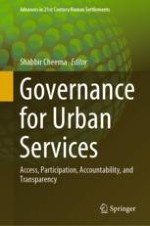2020 | OriginalPaper | Chapter
Public-Private Partnerships to Improve Urban Environmental Services
Authors : Bharat Dahiya, Bradford Gentry
Published in: Governance for Urban Services
Publisher: Springer Singapore
Activate our intelligent search to find suitable subject content or patents.
Select sections of text to find matching patents with Artificial Intelligence. powered by
Select sections of text to find additional relevant content using AI-assisted search. powered by
